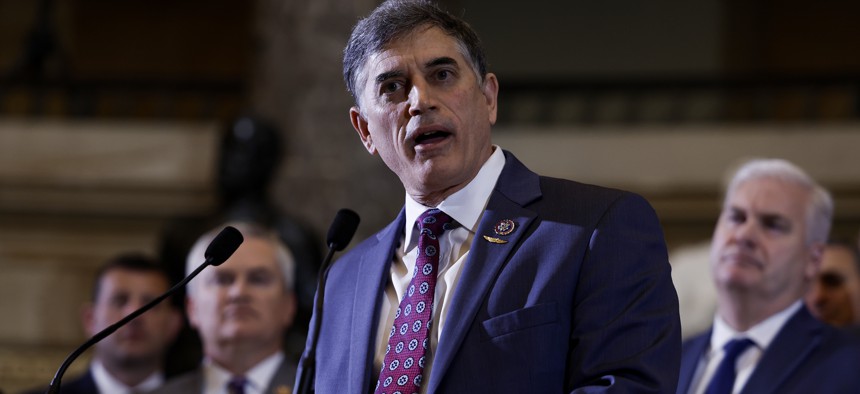House GOP Will Try to Block D.C. Police Reforms

Republican Rep. Andrew Clyde of Georgia is a co-sponsor of the resolution to block the district's police reforms. Anna Moneymaker/ Getty Images
After successfully overturning the district’s criminal code rewrite, House Republicans are now targeting police reforms passed by the city council.
Those who believe Congress should not meddle in Washington, D.C.’s democratic process are frustrated that House Republicans are trying to repeal another law—this time the police reforms the city council passed in 2020 in the aftermath of George Floyd’s killing by police.
“Here we go again,” said Rep. Eleanor Holmes Norton, the district’s lone and non-voting representative in Congress.
Just a day after Senate Democrats joined Republicans in using Congress’ authority to overturn Washington, D.C.’s revision of its criminal code, two Republican House members on Thursday introduced a resolution of disapproval to do the same over what they called “deeply flawed” misguided reforms.
The move takes aim at a law passed by Washington, D.C.’s City Council last December making permanent the 2020 reforms passed in an emergency piece of legislation. The changes banned the hiring of officers with a history of serious misconduct, required the swift release of the names and body-camera footage of officers who use force on civilians, wrested control of the disciplinary process from the police union, and banned the use of chemical irritants or rubber bullets on peaceful protesters, according to the Washington Post.
Republican Reps. Andrew Clyde of Georgia and Andrew Garbarino of New York said in a press release announcing the resolution that the reforms have driven away Washington, D.C., police officers, creating a shortage amid escalating crime.
“As the Metropolitan Police Department grapples with the District’s ongoing crime crisis amidst a historic staff shortage, the D.C. Council is determined to enact a deeply flawed bill that prevents officers from effectively protecting and serving Americans in Washington,” said Clyde, who sponsored the House resolution overturning the city’s criminal code changes.
“Alarmingly, this misguided law will inevitably jeopardize the MPD’s ongoing efforts to recruit and retain officers—worsening an already serious problem,” he said.
The city’s police union has come out in support of the resolution. It had unsuccessfully challenged in federal court a provision in the reforms barring the union from negotiating disciplinary rules during contract talks.
The move to overturn the reforms “is necessary to protect public safety in our Nation’s Capital,” D.C. Police Union Chairman Gregg Pemberton said in Clyde and Garbarino’s press release. The reforms are “a dangerous law that destroys collective bargaining rights of MPD police officers, eviscerates due process, reduces less-lethal options for law enforcement during a riot, and further contributes to the critical staffing crisis that is plaguing the Metropolitan Police Department.”
The bill is seen as another assault by Congress to overrule the wishes of the city’s government.
“I don‘t know if they feel emboldened,” Norton said of the latest proposal, and the fact that “we lost many Democrats.”
Indeed, 31 Senate Democrats and two Independents—Angus King of Maine and Kyrsten Sinema of Arizona—joined Republicans in repealing the criminal code. President Joe Biden shocked Democrats by saying he would not veto the resolution.
As with the previous vote, Republicans will likely pressure Democrats to go along again in overturning Washington’s law or face being painted as soft on crime.
Norton said she is “hopeful” that Democrats won’t vote to undo the district’s police reforms.
Mayor Muriel Bowser’s veto of the criminal code changes opened the door to allow some Democrats like Michigan Sen. Debbie Stabenow to support overruling the city council.
Bowser did not veto the police reforms, however. The Post reported that she expressed disapproval of the council rushing to make policy changes without holding public hearings.
What’s more, Biden might be less likely to overturn police reforms. In defending Biden’s decision to not veto the overturning of the city’s criminal code, White House Press Secretary Karine Jean-Pierre said during a press conference that reforming policing is a major priority for the president but the city’s criminal code “does not actually do that,” she said.
Kery Murakami is a senior reporter for Route Fifty.
NEXT STORY: Justice Launches $8M Smart Policing Grant Program






